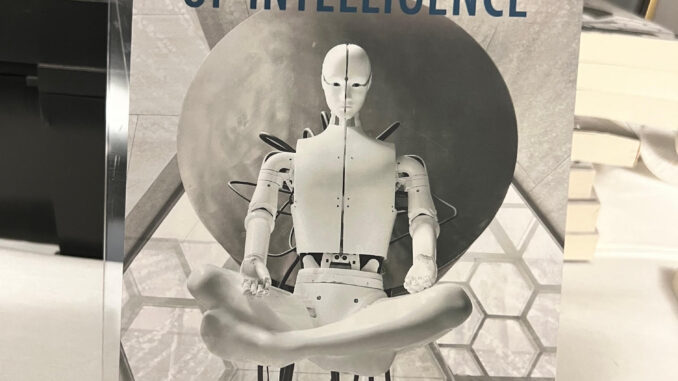
Emily Fritz | A&E Editor
Feb. 09, 2023
Anyone who has taken care of a Tamagotchi or a Webkinz pet or even named their Roomba vacuum understands the appeal of personifying their robot or virtual friends. With artificial intelligence agents like Siri and Alexa evolving faster than we sometimes realize, it can be easy to forget that we aren’t actually interacting with a literal human substitute.
Dr. Noreen Herzfeld, Reuters Professor of Science and Religion at St. John’s University & The College of St. Benedict, recently authored “The Artifice of Intelligence: Divine and Human Relationship in a Robotic Age,” which focuses on how artificial intelligence affects the authenticity of our relationships with each other as well as with our virtual companions.
“We live in a society that is saturated with technology. Much of it is influencing us behind the scenes and we don’t realize it,” she said.
Using Karl Barth’s four injunctions regarding embodiment, communication, agency and emotion, Herzfeld adequately describes how machines repeatedly fail to accompany us on a level that is comparable to how we relate to each other.
“The biggest shortcoming is AI’s lack of emotion. It can’t care about you, or anything. [It is] pretty sociopathic…But, as I pointed out, emotion depends on embodiment as [an essential].”
Duquesne University had the privilege of hosting Herzfeld on Feb. 7 for a lecture about her new book and then a brief Q&A session with Carnegie Mellon University’s Dr. John Dolan, who serves as a principle systems scientist.
The event was sponsored through a partnership between Duquesne’s own Carl G. Grefenstette Center for Ethics in Science, Technology and Law and the Pittsburgh-based Beatrice Institute.
Attendees present included Duquesne students and faculty, members of the Beatrice Institute and community members. Many audience members were eager to ask their own questions about the capabilities of AI for experiencing humanity through mercy or their efficiency and the opportunities to deploy AI robotics into the trenches of warfare.
There were also a number of questions that tied artificial intelligence to theology more directly, with particular discussion about the uncanny valley and the numerous attempts to create machines in the likeness of people, or through God’s image.
The evening ended with the opportunity for participants to purchase a copy of Herzfeld’s book and have it signed.
Dr. John Slattery, director of the Grefenstette Center, explained to The Duke how the efforts of the organization on-campus continues to contribute to the conversation regarding the intersection of technology, theology and ethics.
“To understand the world in different ways, it doesn’t have to be bifurcated. It doesn’t have to be split. As humans, we naturally want to understand how the world works, which is sort of what we consider science today, but we also want to understand why we exist…which is really sort of the basis of all faith and philosophical practices today,” he said.
“So if you think of those as a reflection of being human, then the split between science and religion is a very modern split.”
Slattery had the opportunity to read “The Artifice of Intelligence” and spoke highly of the work.
“In this book, she does a really wonderful job, sort of breaking apart the hype from the reality of what AI is and then taking this real-world artificial intelligence, these real-world robots, other things and asking hard questions about ‘what does it mean for human relationships?’”
“She does a great job of taking all of these technological examples and then using them as a lens to see this broader sort of religious question of ‘what does it mean to be in a relationship with someone and what can we value about human relationships?’”
Herzfeld’s book is available for pre-order before its official release on Feb. 28. Those looking for future events hosted by the Grefenstette Center can learn more at https://www.duq.edu/research/centers-and-institutes/grefenstette-center/.
